|
|
|
Sort Order |
|
|
|
Items / Page
|
|
|
|
|
|
|
| Srl | Item |
| 1 |
ID:
191851
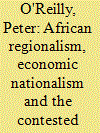

|
|
|
|
|
| Summary/Abstract |
Over the last decade, a new developmentalism has taken root across Africa, centred on promoting local production and industrialisation. One unintended consequence of this has been the proliferation of economically nationalist policy measures that have increasingly come into tension with the aims of regional integration in Africa. This article sets out to offer insights as to why these tensions are emerging by focusing on the East African Community (EAC) and the growing trend of economic nationalism among its members. Contrary to what rationalist and structuralist accounts might presume, this article argues that this rise in economic nationalism is instead reflective of a weakening of the discursive imperative – or social purpose – that had initially converged various actors around the EAC's integration agenda when revived in 2000. While drawing from the EAC's experience, it concludes by highlighting a broader legitimacy dilemma facing African regional organisations within this ‘new developmentalism’.
|
|
|
|
|
|
|
|
|
|
|
|
|
|
|
|
| 2 |
ID:
191853
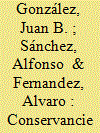

|
|
|
|
|
| Summary/Abstract |
Are conservancies hotspots for communal violence and if so, do rainfall anomalies increase the likelihood of violence? The consensus from a rich number of case studies suggests that conservancies (e.g. national parks, game reserves) increase tensions between communities, which often lead to violent conflicts. Yet, these insights remain to be empirically tested using a large-N study. We examine this claim and explore if rainfall anomalies have an amplifying effect on violent conflicts. We contend that the spatial convergence between conservancies and rainfall variability can spark conflicts over access to resources in times of scarcity and create strategic opportunities to satisfy secondary goals in times of abundance. To test our expectations, we use sub-national data from East Africa between 1990 and 2018. Our results suggest that regions with conservancies are somewhat more prone to communal violence and find strong evidence that positive rainfall anomalies increase the likelihood of violent communal conflicts in regions with a conservancy.
|
|
|
|
|
|
|
|
|
|
|
|
|
|
|
|
| 3 |
ID:
191852


|
|
|
|
|
| Summary/Abstract |
This article reflects on the effects of the recent mining boom on the (trans-)formation of the state in D.R. Congo. To do so, it proposes to integrate macro- and micro- approaches to the political economy of mining into a broader analysis of the power practices of actors at different levels of the state apparatus. Taking the copper mining sector as a case study, it explores the various means by which the presidency, provincial authorities and customary chiefs have drawn resources from mining in the period from the early 2000s to the present. This analysis highlights the various resources that state actors at different levels use to assert their authority over foreign mining companies. From a broader perspective, it shows that, although the liberalisation of the mining sector has opened up new revenue opportunities for all these actors, it has not resulted in a significant power redistribution between them.
|
|
|
|
|
|
|
|
|
|
|
|
|
|
|
|
| 4 |
ID:
191850
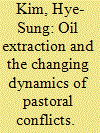

|
|
|
|
|
| Summary/Abstract |
Communities inhabiting the arid and semi-arid areas of eastern Africa have long suffered from and engaged in pastoral conflicts. However, since some countries in the region became oil producers, the conditions affecting pastoral conflicts have changed. This study examines how oil extraction may influence pastoral conflicts by using a survey experiment conducted in Turkana County, Kenya, on a sample of 801 respondents. The study finds that overall, respondents’ perceived risks of pastoral conflicts decrease when they are primed about the consequences of oil extraction leading to fundamental changes in pastoral livelihoods, such as an increase in employment opportunities in the oil sector and rapid social changes. The residents of Turkana view pastoral conflicts as customary as long as pastoralism continues and fundamental changes to pastoralism-based livelihoods originating from oil discovery and extraction may lead to a decrease in the pastoralist population engaging in pastoral conflicts.
|
|
|
|
|
|
|
|
|
|
|
|
|
|
|
|
| 5 |
ID:
191855
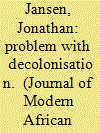

|
|
|
|
|
| Summary/Abstract |
In the heat of the decolonisation struggles of the 2000s, there has been little space or tolerance for conceptual criticism of this important moment in global history. Using the South African case, this article outlines some of the dilemmas of decolonisation as a concept and method for dealing with legacy knowledge in the aftermath of colonialism and apartheid. The status of whites as citizens rather than colonials, the lack of determination of meanings of decolonisation within public universities, and the defanging of a potentially radical concept are among the concerns raised in this critical work on the uptake of the idea in post-apartheid society. What this criticism points to is the need for a theory of institutions when dealing with radical curriculum change rather than a politics that relies so much on the rhetorical, the symbolic and the performative in the demand for decolonisation.
|
|
|
|
|
|
|
|
|
|
|
|
|
|
|
|
| 6 |
ID:
191854
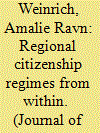

|
|
|
|
|
| Summary/Abstract |
This paper explores the Economic Community of West African States’ (ECOWAS) citizenship regime by investigating the institutional perceptions of five departments of the ECOWAS Commission. Creating a citizenship regime has been a central objective of the organisation's institutional framework but previous research has refrained from examining its multiplicity. The paper uses the concept of citizenship regime consisting of the dimensions rights, access, belonging and responsibility mix as the conceptual lens and draws on institutional documents and primary data from interviews conducted at the ECOWAS Commission. The paper contributes to current debates in citizenship studies and African regionalism and the literature on supra-national citizenship building, regional integration and governance research in Africa and elsewhere. The empirical data show that movement is central to the ECOWAS citizenship regime, whether formulated in terms of a right, as a way to facilitate access, or a way to establish a sense of regional belonging.
|
|
|
|
|
|
|
|
|
|
|
|
|
|
|
|
| 7 |
ID:
191849
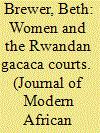

|
|
|
|
|
| Summary/Abstract |
This article examines the gacaca trials of women accused of perpetrating the Rwandan genocide, asking whether and how ideas about their gender impacted their defences, testimonies and experiences as defendants. It uses court reports of the trials of 91 accused women; a set of sources that provides novel insights into the role of gender in an African transitional justice system. These sources reveal that ideas about gender – particularly female peacefulness and passivity – were commonly invoked by both accused women and wider trial participants. These gendered ideas not only helped women to achieve acquittals, but they also contributed to the Rwandan state's construction of a ‘truth’ narrative that ordinary Rwandan women are not capable of genocide violence. Additionally, women's trials reveal a further function of the gacaca process: as a political tool that made moral judgements about contemporary Rwandan women's domestic roles and place within the household.
|
|
|
|
|
|
|
|
|
|
|
|
|
|
|
|
|
|
|
|
|